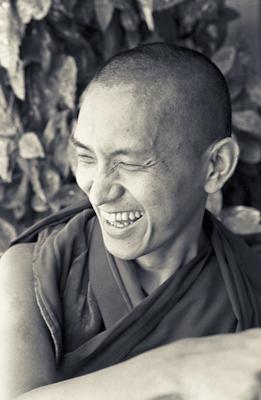When we say we “look after ourselves” or we “take care of ourselves,” what does that mean? In our daily life, whenever we’re practicing Dharma, at that time we’re taking care of ourselves.
Whenever we’re practicing meditation, we’re taking care of ourselves. When I say “meditation,” I mean lamrim meditation. This is not what people call meditation, not what just anybody calls meditation, but lamrim meditation—from guru devotion to tantric meditation, with the two stages—all done with renunciation, bodhicitta and right view.
Then, even practicing Highest Yoga Tantra, secret mantra, Vajrayana, because we’re practicing it with the lamrim—with renunciation, bodhicitta and right view —it becomes the cause to achieve liberation from the oceans of samsaric suffering and its causes. Practicing with bodhicitta, it becomes the cause to achieve enlightenment. If we’re practicing with the right view, it becomes the antidote to samsara and its root, by eliminating or cutting ignorance. It doesn’t become the cause of samsara, the cause of delusion; instead it becomes the antidote, that which eliminates ignorance, the delusions.
So, I’m talking about meditation like this—not just what anybody in the world calls “meditation.” I’m not including everything called meditation. There are meditations where we can destroy our mind; there are meditations where we can destroy our Dharma wisdom. There are practices people do that they call meditation, which actually cause us to be in samsara—they cause us to be reborn in the lower realms in particular, by causing us to develop and increase delusions. That’s not really meditation, but those individual people call it “meditation.” I’m not counting those things.
Whenever we’re practicing Dharma in daily life, at that time we’re taking care of ourselves, we’re looking after ourselves. Whenever we’re practicing meditation, as I explained, the lamrim meditations, then we’re looking after ourselves; we’re taking care of ourselves.
Whenever we’re practicing guru devotion, seeing the guru as a buddha, we’re taking care of ourselves, we’re looking after ourselves. Whenever we’re practicing renunciation, we’re taking care of ourselves. Whenever we practice right view, we’re looking after ourselves; we’re taking care of ourselves.
We’re taking care of ourselves, we’re looking after ourselves, and we’re protecting ourselves from suffering and its causes; from problems. By protecting ourselves from the cause of the suffering, the delusions, we’re protecting ourselves from anger, attachment and ignorance. That’s the real protection; that’s the real taking care of ourselves or looking after ourselves. Do you understand?
So the definition of “taking care” or “looking after” actually means practicing Dharma. When we’re not practicing Dharma, we’re following the delusions—we’re following anger, attachment and ignorance. We become their servant, we become their slave. We become a slave for the delusions, a slave for attachment. We become a slave for anger, then we try to harm our enemies, all the time making plans how to harm them, how to destroy them, how to no longer have any enemies in the world.
We’re making plans, including wars. When it becomes very big, it becomes war. When our plan becomes to destroy all enemies and have power, then it becomes war and many millions of people get killed, many millions of people have to suffer for our happiness, so we don’t have enemies. So many millions of people have to suffer, have to be killed, can you imagine? This is without counting the animals that die in the oceans and on the ground from the bombs we drop.
When we’re following the three poisonous minds, when we become a slave to the three poisonous minds, then we’re not taking care of ourselves, we’re not looking after ourselves. By becoming their slave, by following the delusions, then they harm us constantly, torturing us and forcing us to suffer. By creating karma motivated by the delusions, the result is suffering now and in the future, continuously. Following ignorance, anger, attachment, the delusions, is regarded as taking care of ourselves, but that’s the wrong understanding of taking care, it’s a wrong view. We’re harming ourselves if we’re not taking care of ourselves.
When we follow the three principal aspects of the path to enlightenment, that’s taking care of ourselves. Then, of course, on top of that there’s the tantric path.
The best way of taking care of our life is living our life with bodhicitta. That’s the best way of taking care, making our life most meaningful, so it is most beneficial to us and most beneficial to others who are numberless. That is making our life most beneficial to numberless sentient beings. Living our life with bodhicitta—that’s the best way of taking care of our life. Protecting our own life with bodhicitta—that’s the best protection.































